Ros Neilson on the Foundations of Early Literacy Assessment (FELA)
2 Replies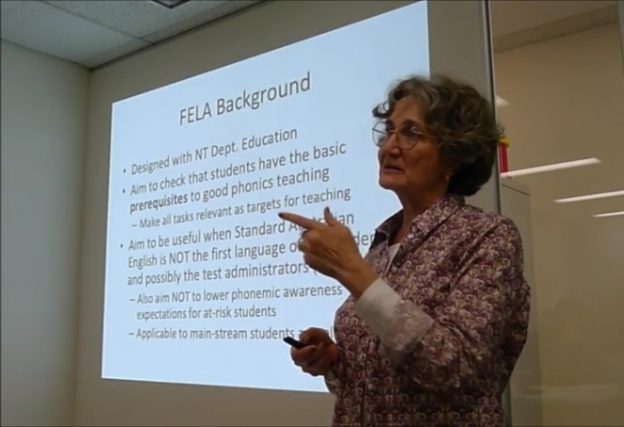
Last month at our office we had the pleasure of hosting Speech Pathology legend Roslyn Neilson for a talk about her newish early literacy assessment, the FELA.
The FELA is intended to supersede two of Ros’s previous tests, the SPAT-R and SEAPART, and help teachers, therapists and others assess phonemic awareness and alphabetic knowledge, which are vital, teachable early literacy skills.
The FELA can be used in preschool screening as well as progress monitoring through the early years of primary school.
On the day, we decided to video the session, as we could only fit 30 people into our biggest room (which Ros scarily called a Conference Centre), and had to turn a few people away, plus many other interested people were too far off or too busy to come.
Here’s the video, with my apologies that it’s blurry at the start and there is a short break and you might need to turn up the volume towards the end (camera malfunction). Ros’s slides can be downloaded here.
Thanks so much to Ros for freely sharing her time and expertise so generously, and for the chocolates, which we are still enjoying. The FELA is available from Ros’s website, takes up to 30 minutes per child and I think is very reasonably priced at $198 inc GST. If you’d like to take a look at it and you’re in Melbourne, Ros has left us a copy, and you’d be welcome to browse it.
Thanks also to fab Spelfabet staff Renee Vlahos, Caitlin Stephenson and Tessa Weadman (yes, I am going to put them on the website soon) for their help, and to my brother for the huge bag of apples that got me making easy, delicious apple cake (here’s the recipe, but I microwaved and drained the apples, and beat the eggs). After I bought my Goodwill Wine I found out they raise funds for Code Read Dyslexia Network. Please consider when next ordering wine.
My brother just gave me ANOTHER huge bag of apples, so maybe that means I should invite another speaker. Ros is a pretty hard act to follow, but let me know if you have ideas/suggestions.
Free Learning Difficulties Including Dyslexia webinars
8 Replies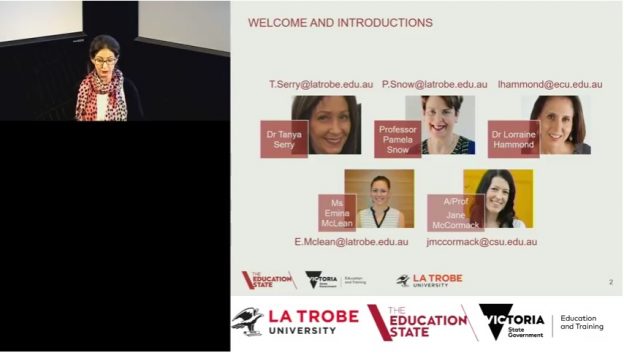
La Trobe University and the Victorian Department of Education have this year collaborated to run workshops across Victoria about learning difficulties including dyslexia. The workshops have been available to teachers and other Department of Education staff.
The information from these workshops is now being made available free online via YouTube as webinars. Wow. Amazingly generous of both the University and the Department, since most professional development of this type and quality is paywalled. So thanks to all involved.
The webinars are presented by Dr Tanya Serry from La Trobe University, and the workshops on which they are based were developed with Professor Pamela Snow, Ms Emina McLean and Assistant Professor Jane McCormack also from La Trobe, and Dr Lorraine Hammond from Edith Cowan University in WA. (more…)
Pom pom phonemes
2 Replies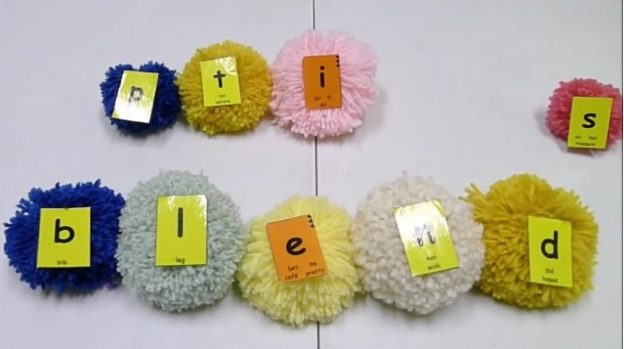
For a while I’ve been trying to think of a good way to represent individual sounds in words (phonemes) in a video.
First I tried using my toy fruit and vegetables. These showed nicely that actual productions of a phoneme (allophones) can be slightly different. A cob of corn is still a cob of corn, whatever its size or shape. An /n/ sound is still /n/, no matter where it’s found in a word.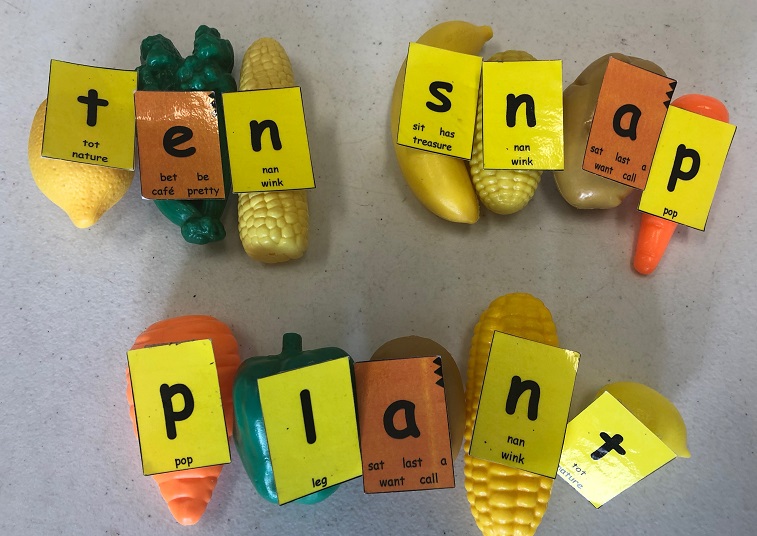
Geraldine the Giraffe learns schwa
3 Replies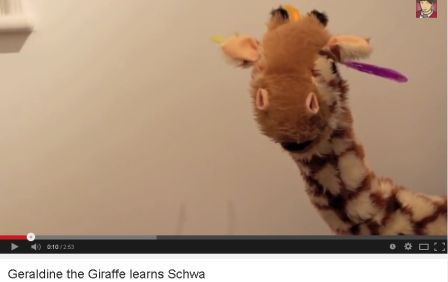
A colleague has just pointed out a YouTube video which I think perfectly makes the point that a little bit of phonics knowledge can be a dangerous thing.
It illustrates why we urgently need proper, linguistically accurate training for teachers and early literacy authors/publishers.
The video is called Geraldine the Giraffe learns schwa. It seems to be from the UK, and it is being shown to at least some Grade Prep children (5-6 year-olds) here in Melbourne.
Geraldine the Giraffe is a puppet who, after some groovy music and a bit of chitchat, is told she will be learning about the “u” sound.
The letter “u” appears on the screen and she is asked to say the sound “u” (as in cup):
 Then the narrator says, “Rather than learning about the ‘u’ sound with the U letter shape, we’re going to learn about the schwa, and the schwa is the name that we give to the ‘u’ sound in words using a different letter.”
Then the narrator says, “Rather than learning about the ‘u’ sound with the U letter shape, we’re going to learn about the schwa, and the schwa is the name that we give to the ‘u’ sound in words using a different letter.”
Unfortunately, this is simply wrong. The sounds “u” as in “cup” and the schwa sound are two completely different sounds. (more…)
Multisyllable words
4 Replies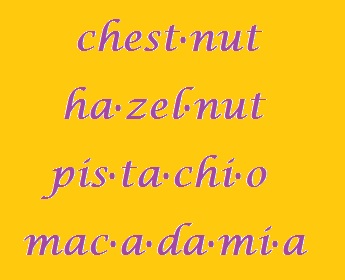
Breaking up multisyllable words
When first introducing multisyllable words to learners, I like to break them into separate syllables with little dots, like this:
crick·et ba·na·na hel·i·cop·ter hip·po·pot·a·mus
Dots are more subtle than hyphens or spaces, but help beginners to see the syllable boundaries, and know where to stop and blend each "mouthful" of the word.
I don't ask learners to put these dots in themselves when writing/spelling, I just put them in new words for the first time a learner reads them.
What makes multisyllable words harder?
As well as all the skills required to read and spell one-syllable words, learners reading multisyllable words have to:
- Work out where one syllable ends and the next one begins,
- Learn the many extra spelling patterns used in multisyllable words e.g. the "ti" in "action", the "y" in "funny" and the "age" in "luggage",
- Keep all the syllables in memory long enough to say each whole word,
- Work out whether any of the syllables are unstressed, by trying out different stress patterns.
Free phonological awareness test
17 Replies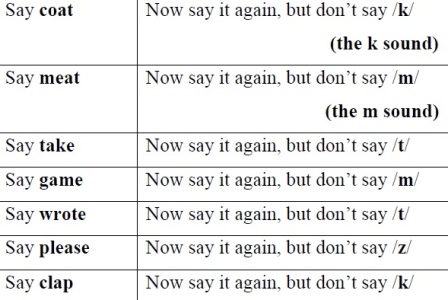
Dr Jerome Rosner’s Test of Auditory Analysis Skills has been around forever, and is a simple, quick, plain-English test of how well a child in the early years of schooling can hear the identity, order and number of syllables and sounds in words.
These skills are nowadays known as Phonological Awareness. A child’s Phonological Awareness is one of the strongest predictors of his or her literacy achievement.
Who can use the TAAS, with whom, and how long does it take?
The Rosner TAAS is designed for use with children in the early years of schooling, so from about four or five – when children start to be able to grasp the idea that words are made of sounds – up till about age eight, though it can be used with older struggling learners too.
It has 13 questions and takes about three minutes to administer. The instructions and scoring system are simple and straightforward, and there’s a table that shows you how many items you’d expect a child to get right at Kindergarten/Prep level and Grades 1, 2 and 3.
It’s thus a handy screening tool for parents and teachers at this time of year, when everyone’s trying to work out who’s doing OK with early literacy, and who might need a bit of extra help.
It can help bring possible difficulties with Phonological Awareness to your attention.
You don’t need a PhD or special materials to administer the Rosner TAAS, and you can get it right now for $0 just by clicking here.
The unstressed vowel
6 Replies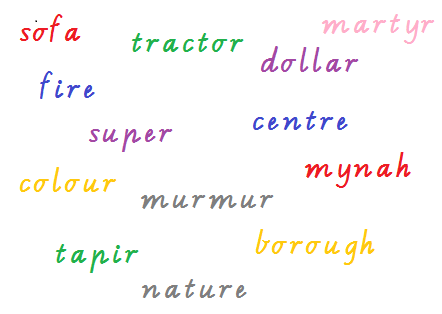
One of the hardest things about spelling words with more than one syllable is managing the unstressed vowel (called “schwa” by linguists).
The unstressed vowel is the little “uh” sound we say in “weak” syllables, like the “er” in “water”, the “ar” in “liar”, the “or” in “tractor” or the “a” in “China”. It can be spelt using just about any vowel spelling.
If learners are introduced to long words too quickly, before they have grasped the major vowel spellings in one-syllable words, they can think that this vowel is an “u” sound as in “cut”.
This can make them very confused about how to spell this sound, and how to spell long words generally, since this sound seems to be everywhere in long words.
Another thing which can be really confusing when learning to spell words with more than one syllable is identifying syllable boundaries.
A syllable can be just one letter, or it can be half a dozen or more. Learners need to familiarise themselves with which patterns indicate the end of a syllable, and how to munch their way through long words just one mouthful/syllable at a time, not try to swallow words whole.


